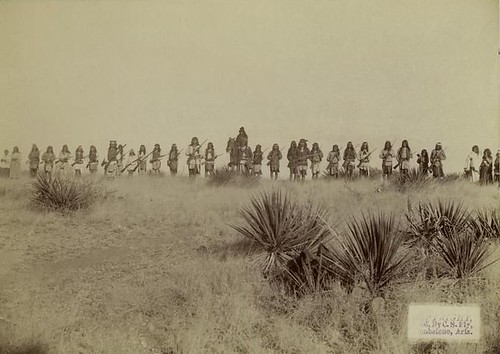Once I moved about like the wind. Now I surrender to you and that is all. -- Geronimo
This is a photo (slightly cropped to fit) of the last band of aboriginal people in North America to fight and resist the takeover of their landbase by the United States government. Numbering about 39 men, women, and children, this band of Apaches including Naiche, son of Cochise (on horseback) and Geronimo (standing in front of Naiche), evaded capture by a quarter of the US army and three thousand Mexican troops, finally turning themselves in, ending a key chapter in human history.
The ending of lifeways apart from civilization among the aboriginal peoples of North America happened in about the same way it has happened worldwide. Central among proximate causes has been the growth of the population of those of us in civilization. The root cause has been civilization itself.
The people in the photo are standing on a spot in what is today southern Arizona. Twenty years after the photo was taken, my grandmother took a teaching job in a small town not far from that spot. She lived into the late 1980s. Indeed, it wasn't long ago that people still lived freely, as had their ancestors, in ways foreign to agriculture-based industrial civilization, right here where we in the United States live today. [1] [2]
Likewise, relative to the whole of human history, it has been only in the last instant that not everyone has lived in small bands, foraging and hunting for food, attuned to rather than trying to separate themselves from nature. [3]
Today as we puzzle over where we went wrong ecologically and socially, and scramble to find some way to fix things (prevented by those in power from taking meaningful action), we forget that for 3 million years we had many variations on a basic system which worked, made for fulfilling lives, and was sustainable.
I expect to focus much more on this topic in future writing.
For some insightful references see the section on core ecological issues and the relevant books in the book section. For an engaging source on the events surrounding the photo above, try David Roberts' Once They Moved Like the Wind.
_______
[1] During much of their history, and certainly at the time of the photo, the Apache were not strictly hunter-gatherers. Owing to their roots, however, their surrender is an appropriate symbol for the loss of a way of life based not on agriculture, attuned to the natural world.
[2] While Geronimo's surrender marked the official end of the "Apache wars," reports suggest remnant bands of Apaches continued to live freely in the mountains of Mexico for years afterward.
[3] The period since the dawn of agriculture 10 thousand years ago to the present represents about one third of one percent of human history.
